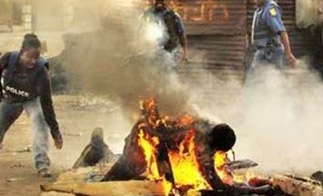Residents in a Bolivian border town burned two Brazilian men alive in retaliation for alleged homicide crimes, typifying the kind of vigilantism that is common in areas where there is little faith in the police and judiciary.
Around 300 residents in the Bolivian town of San Matias stormed the police station on August 14, pulling two Brazilian men from their jail cells and burning them alive, apparently in revenge for the murder of three Bolivians in a shoot-out the night before, reported Peru 21. Despite police efforts to restrain the mob with teargas, they were overwhelmed.
The police chief of San Matias, a town located on the Brazilian border, told press that the murder of the Brazilians was related to an argument over money for motorcycles stolen in Brazil and sent to Bolivia to be sold.
InSight Crime Analysis
San Matias is a strategic crossing point for drug traffickers and contraband smugglers, particularly Brazilian gangs that move product between Bolivia and Brazil. Nevertheless, security on the Bolivian side of the border is lax, as a report by Bolivian newspaper El Dia outlined earlier this year. Even though the town has a population of 15,000 and a border area of some 300 square kilometers, only 33 soldiers patrol the region, enabling illegal trafficking networks to thrive. The judiciary is similarly under-resourced, with only one prosecutor serving the town.
The lack of security investment in places like San Matias, as well as the ensuing public perception that the state has no real authority in the area, has encouraged vigilantism, as played out with the lynching of the two Brazilian men. Such cases of mob justice are by no means isolated to San Matias. By the government’s own admission, 85 percent of residents in four of Bolivia’s largest cities do not report crimes because they have no faith in the police or judicial system. In El Alto, for example, two suspected criminals were burned to death last year by locals.
Such cases of vigilante justice can be found in poor and isolated communities across Latin America, wherever the state has proven to be ineffective in containing violent crime. Mexico in particular has seen the spread of self-defense groups. Residents in one mostly indigenous community, Cheran, attracted attention by taking up arms against criminal groups carrying out illegal logging in the area, such as the Familia Michoacana and the Knights Templar (Caballeros Templarios). In Guerrero state, citizens have detained suspected criminals and in some parts even created their own community police force and council system to hand down punishments such as community service.
Though not all movements in the face of state neglect are violent — the Costa Rican town of Las Orquideas organized a peaceful resistance movement last year in response to the government’s inability to tackle drug traffickers — there are a significant number that are. Such vigilantism is indicative of the problem faced by states throughout the region as they try to assert control over their territory while combating criminal groups.

